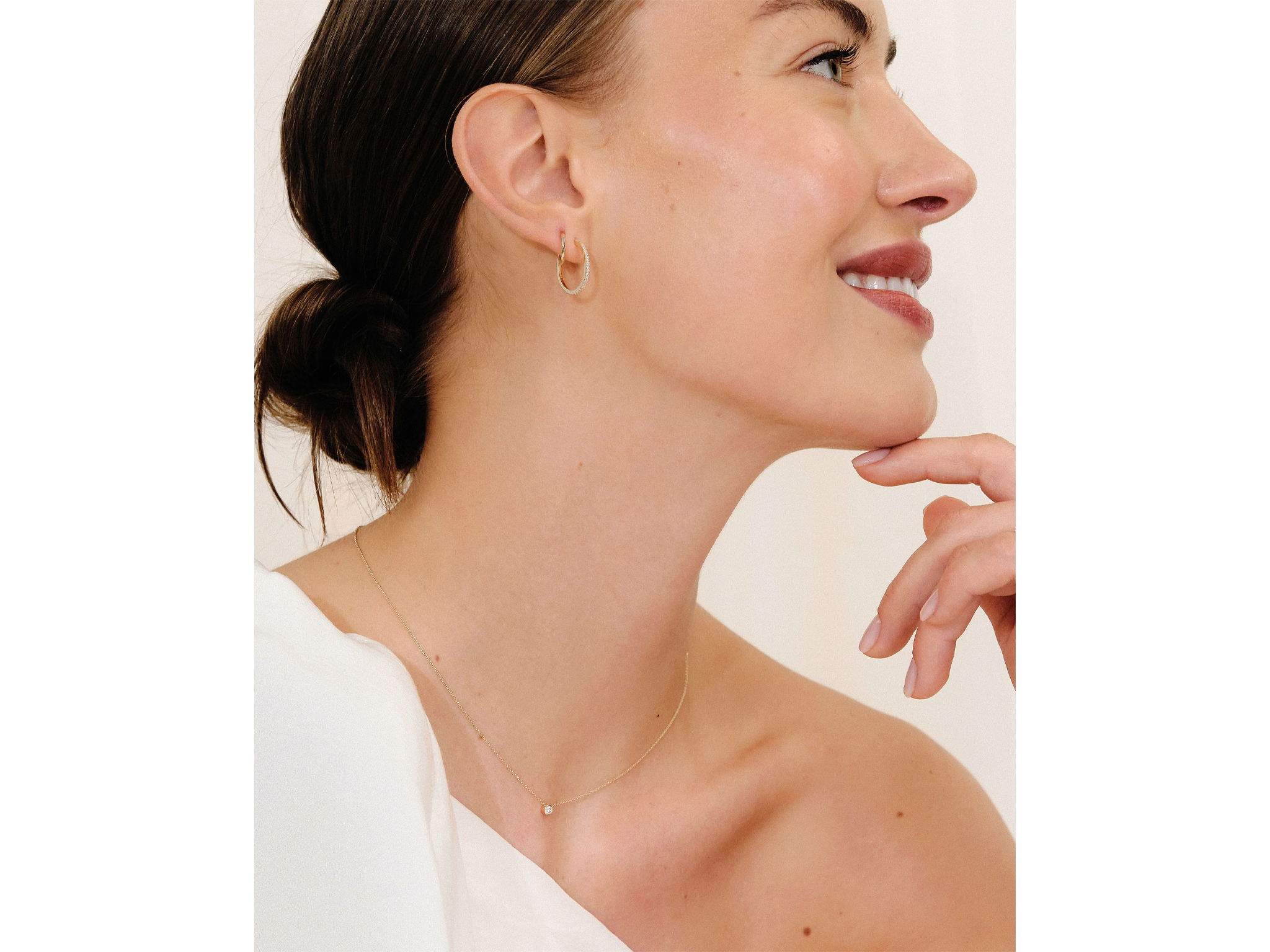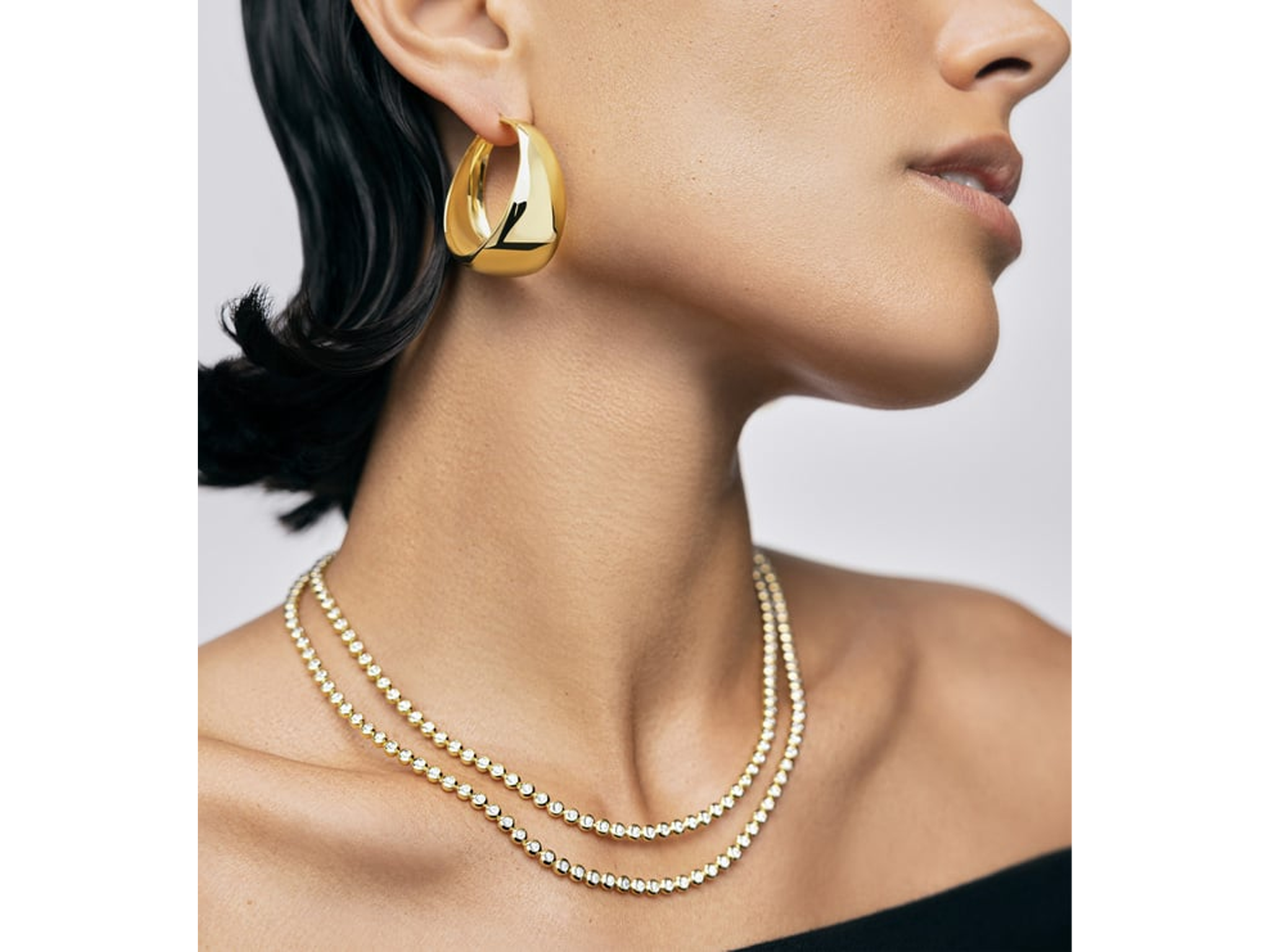Your support helps us to tell the story
From reproductive rights to climate change to Big Tech, The Independent is on the ground when the story is developing. Whether it's investigating the financials of Elon Musk's pro-Trump PAC or producing our latest documentary, 'The A Word', which shines a light on the American women fighting for reproductive rights, we know how important it is to parse out the facts from the messaging.
At such a critical moment in US history, we need reporters on the ground. Your donation allows us to keep sending journalists to speak to both sides of the story.
The Independent is trusted by Americans across the entire political spectrum. And unlike many other quality news outlets, we choose not to lock Americans out of our reporting and analysis with paywalls. We believe quality journalism should be available to everyone, paid for by those who can afford it.
Your support makes all the difference.
When it comes to sustainability in fashion, it’s often clothes that dominate the conversation - but there’s just as much exciting progression in the jewellery world. From lab grown diamonds to the elimination of low-quality materials, myriad brands are ripping up the rulebook and opting for more ethical processes.
The most pressing issue for sustainability in the jewellery industry is the environmental damage of mining for precious metals and gemstones. Traditional methods result in deforestation, soil erosion and water pollution, with just one carat of diamonds causing up to 3.1 tonne of earth displacement and requiring 8.9l of fuel consumption.
The ethical implications are equally bad, with diamond mining leading to the displacement of both people and wildlife. There’s also the issue of a lack of traceability, making a transparent and ethical supply chain near-impossible. Materials can be taken from some of the poorest regions on earth, pass through multiple hands on their way to our market and the workers do not receive a penny.
Turns out diamonds aren’t a girl’s best friend, after all. But it’s not all doom and gloom. Sustainable jewellery can be made with recycled metals or using renewable energy sources that minimise both the carbon and human footprint of mined materials.
Then there’s lab grown diamonds, which now make up around 17 to 20 per cent of the global diamond market. An increasingly popular choice among couples for engagement rings, the alternative is chemically, physically and optically identical to a mined diamond, owing to the earth’s conditions of extreme pressure and heat being recreated inside a machine.
The demand for artificial alternatives is driven by millennials and generation Z, who are not only being lured in by the ethical benefits of lab grown gems, but also their affordability. Pandora’s lab grown range starts from £100 while styles from Monica Vinader start from £80.
So, change is certainly afoot but with so much greenwashing surrounding the fashion industry, which brands can you actually trust? To help you shop for jewellery more sustainably, we’ve rounded up the best eco-conscious brands to bookmark. While some call themselves a sustainable brand, others are making serious progress with fully lab grown or recyclable collections.
Best sustainable jewellery brands
Edge of Ember

Founded by Lynette Ong in 2014, Edge of Ember was inspired by her travels in Asia and a desire to promote affordable, high-quality jewellery made with sustainable materials. Known for its dainty, everyday styles and initials range, Meghan Markle regularly plumps for pieces from the label. The brand is aligned with the UN’s Sustainable Development Goals (gender equality, responsible consumption, protection and climate action) and has pledged since 2020 to only use recycled materials.
This has reduced its carbon footprint by 42.72 per cent, while its exclusive use of lab grown diamonds since 2019 has reduced it by 307 tonnes of CO2 emissions per kg each year. Edge of Ember’s Re/Make jewellery recycling program is the first of its kind in the UK, with customers able to recycle unwanted jewellery in return for store credit.
Mejuri
From colourful gemstone charms to chunky rings, you can discover affordable, everyday jewellery at Canadian label Mejuri. Founded in 2013, it’s made some serious headway toward being a sustainable brand, with 95 per cent of its gold and 92 per cent of its silver coming from recycled sources.
Made thorough 100 per cent carbon neutral production in responsible factories, Mejuri’s popular lab grown range starts from just £148 while its newly mined diamonds adhere to the highest international standards. Tracebility is also important to the brand; it has introduced Salmon Gold, which is gold from re-mining legacy mining waste that’s fully traceable and helps to restore the environment.
Ysso
Mother-daughter duo Alexia and Stalo Karides founded YSSO in 2020, taking inspiration from their Greek roots for the brand’s handcrafted, sculptural pieces. Partnering exclusively with an Athenian workshop, the brand champions traditional Greek jewellery making and techniques.
Limiting mass production and sustaining artisanal skills that have passed down the generations, each piece is utterly unique. Prioritising the use of recycled and locally-sourced materials, the workshops employ environmentally conscious production techniques. Make it your destination for statement earrings, beautifully detailed bracelets and pendant necklaces.
Lark & Berry
Nicknamed the “diamond disrupters” by the jewellery industry, London-based brand Lark & Berry was the first designer brand to exclusively use lab-grown diamonds and stones in its pieces. The label’s diamonds are created using 100 per cent renewable energy and have the same chemical and physical properties as mined diamonds, rivalling them in both looks and longevity. Whether you’re looking for a sustainable alternative to an engagement ring or delicate drop earrings for gifting to a loved one, its pieces are refined and timeless.
Monica Vinader

Monica Vinader is the jewellery world’s worst-kept-secret for classic, everyday pieces with an on-trend twist – see pearl drop chunky earrings, wavey cuffs and cord necklaces. Responsibly sourced materials are a non-negotiable for the label, which only uses 100 per cent recycled silver and gold, with more than half of its gemstone styles traced back to their mined origin. Its latest lab grown diamond collection of initial necklaces are created using 100 per cent renewable energy with full supply chain visibility.
Monica Vinader’s product passport is an industry first, enabling shoppers to trace the origin of their jewellery, from design to doorstop. The brand’s goal is to reach 80 per cent transparency on the Product Passport. Plus, it mends your jewellery free of charge and buys back any unwanted pieces, so nothing goes to waste.
Pilgrim
Founded in 1983 in Denmark, Pilgrim is much loved for its sculptural jewellery pieces – think shell silhouette rings, bow adorned earrings and irregularly shaped chunky studs. The label helps you make a statement with your jewellery choices while not blowing the bank (necklaces start from £24.99, and earrings start from £9.99).
While it’s not a fully sustainable jewellery brand, it’s making important moves in the right direction. The majority of its pieces are crafted from a minimum of 75 per cent recycled materials (bar the clasps, beads and some stones) while its supply chain consists of seven local suppliers in China, where factories are solar powered and all the jewellery moulds and water in the production process are reused.
Roxane First
British fine jewellery brand Roxanne First grew from its eponymous founder’s lifelong obsession with jewellery and her penchant for stacking. The label specialises in solid gold pieces designed for layering, mixing and matching. Playful and fun, expect smiley face rings, mushroom stud earrings and slogan bracelets.
Roxanne First is a member of the Responsible Jewellery Council (the jewellery world’s leading sustainability standard) and its luxury pieces are crafted with ethically sourced diamonds. This means the stones are conflict free and chosen from handpicked suppliers.
Atteya
Sustainable brand Atteya is founded on the belief that jewellery shouldn’t impact the earth. It has partnered with three charities (Treesisters, Coral Gardeners and Care International UK), giving five per cent of each sale to the causes.
All of Atteya’s jewellery is handmade or cast in 100 per cent recycled precious metals in the UK, while single mine origin, fairmined and fairtrade gold is also available on request. The collections also use sustainable, locally made and fully traceable gemstones. Expect jewellery inspired by nature, land and the sea – think sculptural coral necklaces and leaf rings or hoops.
Pandora

Pandora is a behemoth of the jewellery world and, while it doesn’t define itself as a sustainable brand, it’s introduced major changes to its business model. As of late 2023, the brand uses 100 per cent recycled silver and gold to craft all its jewellery (it sources from recycled jewellery, silverware, coins and electronics) while all its facilities are powered by 100 per cent renewable energy.
The label also offers some of the most affordable lab grown diamond pieces in the market (the collection starts from £100), with the carbon footprint of a Pandora lab grown diamond around 95 per cent lower than that of a mined diamond of the same size. The artificial diamonds are grown, cut and polished using renewable energy and easily rival the real deal, offering Pandora-fans a chance to shop jewellery more sustainably.
Kimaï
The founders of Kimaï have pledged to cut out all the murky middlemen and control the whole jewellery production line, from design to delivery. From fine jewellery pieces for special occasions to engagement rings and wedding bands, all its pieces are handmade to order and 18-carat gold plated to ensure durability.
But its the lab grown diamonds that steal the show with Meghan Markle and Emma Watson already fans. Its gems are created via laboratory technology that mimics the growing process of a real diamond. The gems are set in recycled gold, with a fully traceable supply chain and using methods that reduce chemical and water waste.
Voucher codes
For the latest offers on fashion and more, try the discount code below:
Looking for more recommendations? Read our guide to the best sustainable clothing brands, according to a fashion writer




















 English (US) ·
English (US) ·